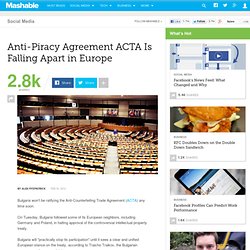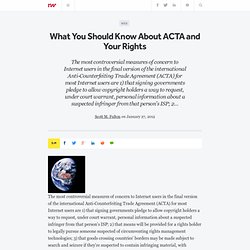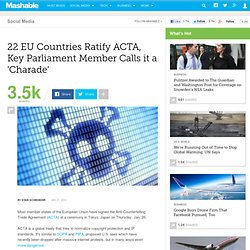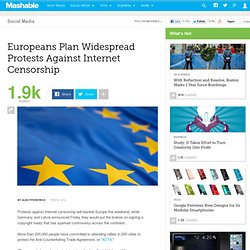

Bulgaria Withdraws From ACTA While Treaty Stalls in Netherlands. Bulgaria won't be ratifying the Anti-Counterfeiting Trade Agreement (ACTA) any time soon.

On Tuesday, Bulgaria followed some of its European neighbors, including Germany and Poland, in halting approval of the controversial intellectual property treaty. Bulgaria will "practically stop its participation" until it sees a clear and unified European stance on the treaty, according to Traicho Traikov, the Bulgarian economy and energy minister. "I'm a pessimist when it comes to regulating an industry, which hasn't adapted to the digital age, through sanctions rather than market means," Traikov told the press, according to Bloomberg.
Meanwhile, ACTA also stalled in the Dutch parliament. Lawmakers in Holland want time to examine the treaty's potential effects on Internet privacy before moving forward with ratification, reported Radio Netherlands Worldwide. The decisions by Bulgaria and the Netherlands come after anti-ACTA protests spread across Europe over the weekend. SEE ALSO: What is ACTA?
What You Should Know About ACTA and Your Rights. The most controversial measures of concern to Internet users in the final version of the international Anti-Counterfeiting Trade Agreement (ACTA) for most Internet users are 1) that signing governments pledge to allow copyright holders a way to request, under court warrant, personal information about a suspected infringer from that person's ISP; 2) that means will be provided for a rights holder to legally pursue someone suspected of circumventing rights management technologies; 3) that goods crossing countries' borders may be made subject to search and seizure if they're suspected to contain infringing material, with exceptions provided for things like personal luggage.

President Obama signed this treaty on October 1, 2011, effectively ratifying it on behalf of the United States. What ACTA is not This treaty is not a law, nor is it a bill or an act, like SOPA or PIPA. Although the treaty has already been signed in the U.S., ACTA is not a law that can be followed or broken by a person. 22 EU Countries Ratify ACTA. Most member states of the European Union have signed the Anti-Counterfeiting Trade Agreement (ACTA) at a ceremony in Tokyo, Japan on Thursday, Jan. 26.

ACTA is a global treaty that tries to normalize copyright protection and IP standards. It's similar to SOPA and PIPA, proposed U.S. laws which have recently been dropped after massive internet protests, but in many ways even more dangerous. Unfortunately (and unlike SOPA and PIPA), ACTA has been signed by many states without a wide, open public discussion.
Australia, Canada, Japan, South Korea, Morocco, New Zealand, Singapore and the United States signed the ACTA on 1 Oct 2011. As of yesterday, they are joined by Austria, Belgium, Bulgaria, Czech Republic, Denmark, Finland, France, Greece, Hungary, Ireland, Italy, Latvia, Lithuania, Luxemburg, Malta, Poland, Portugal, Romania, Slovenia, Spain, Sweden and the United Kingdom. SEE ALSO: ACTA ‘Is More Dangerous Than SOPA’ The ACTA is not yet in effect. Protests Planned Across Europe While Germany Delays Signing ACTA. Protests against Internet censorship will blanket Europe this weekend, while Germany and Latvia announced Friday they would put the brakes on signing a copyright treaty that has sparked controversy across the continent.

More than 200,000 people have committed to attending rallies in 200 cities to protest the Anti-Counterfeiting Trade Agreement, or "ACTA. " "The map of planned protests is just breathtaking," said Holmes Wilson, co-founder of anti-ACTA group Fight for the Future. "You've got tens of thousands of people taking to the streets in small cities, in countries where large street protests are not common. " Proponents of ACTA say that the treaty will help fight global copyright theft. Opponents, fresh off the SOPA and PIPA battlefields, argue that ACTA will harm free speech on the Internet. "This is truly the Internet's Arab Spring," said Fight for the Future co-founder Tiffiniy Cheng. SEE ALSO: What is ACTA? Public opposition to the treaty has already struck Europe.